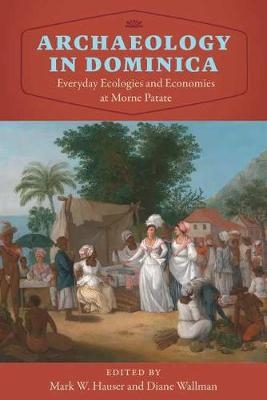
Archaeology in Dominica
Everyday Ecologies and Economies at Morne Patate
Seiten
2020
University Press of Florida (Verlag)
978-1-68340-160-5 (ISBN)
University Press of Florida (Verlag)
978-1-68340-160-5 (ISBN)
Examines the everyday lives of enslaved and free workers at Morne Patate, an eighteenth- and nineteenth-century Caribbean plantation, helping document the under-represented history of slavery and colonialism on the edge of the British Empire.
Archaeology in Dominica examines the everyday lives of enslaved and free workers at Morne Patate, an eighteenth- and nineteenth-century Caribbean plantation that produced sugar, coffee, and provisions. Focusing on household archaeology, this volume helps document the underrepresented history of slavery and colonialism on the edge of the British Empire.
Contributors discuss how enslaved and free people were entangled in shifting economic and ecological systems during the plantation's 200-year history, most notably the introduction of sugarcane as an export commodity. Analyzing historical records, the landscape geography of the plantation, and material remains from the residences of laborers, the authors synthesize extensive data from this site and compare it to that of other excavations across the Eastern Caribbean. Using historical archaeology to investigate the political ecology of Morne Patate opens up a deeper understanding of the environmental legacies of colonial empires, as well as the long-term impacts of plantation agriculture on the Caribbean region and its people.
A volume in the Florida Museum of Natural History: Ripley P. Bullen Series.
Archaeology in Dominica examines the everyday lives of enslaved and free workers at Morne Patate, an eighteenth- and nineteenth-century Caribbean plantation that produced sugar, coffee, and provisions. Focusing on household archaeology, this volume helps document the underrepresented history of slavery and colonialism on the edge of the British Empire.
Contributors discuss how enslaved and free people were entangled in shifting economic and ecological systems during the plantation's 200-year history, most notably the introduction of sugarcane as an export commodity. Analyzing historical records, the landscape geography of the plantation, and material remains from the residences of laborers, the authors synthesize extensive data from this site and compare it to that of other excavations across the Eastern Caribbean. Using historical archaeology to investigate the political ecology of Morne Patate opens up a deeper understanding of the environmental legacies of colonial empires, as well as the long-term impacts of plantation agriculture on the Caribbean region and its people.
A volume in the Florida Museum of Natural History: Ripley P. Bullen Series.
Mark W. Hauser, associate professor of anthropology at Northwestern University, is the author of An Archaeology of Black Markets: Local Ceramics and Economies in Eighteenth-Century Jamaica. Diane Wallman is assistant professor of anthropology at the University of South Florida.
| Erscheinungsdatum | 11.09.2020 |
|---|---|
| Reihe/Serie | Florida Museum of Natural History: Ripley P. Bullen Series |
| Zusatzinfo | 24 black & white illustrations, 12 tables |
| Verlagsort | Florida |
| Sprache | englisch |
| Maße | 152 x 229 mm |
| Gewicht | 538 g |
| Themenwelt | Sachbuch/Ratgeber ► Geschichte / Politik ► Vor- und Frühgeschichte / Antike |
| Geisteswissenschaften ► Archäologie | |
| Geschichte ► Teilgebiete der Geschichte ► Kulturgeschichte | |
| Sozialwissenschaften ► Ethnologie ► Völkerkunde (Naturvölker) | |
| Sozialwissenschaften ► Soziologie | |
| ISBN-10 | 1-68340-160-3 / 1683401603 |
| ISBN-13 | 978-1-68340-160-5 / 9781683401605 |
| Zustand | Neuware |
| Haben Sie eine Frage zum Produkt? |
Mehr entdecken
aus dem Bereich
aus dem Bereich
der stille Abschied vom bäuerlichen Leben in Deutschland
Buch | Hardcover (2023)
C.H.Beck (Verlag)
23,00 €
vom Mittelalter bis zur Gegenwart
Buch | Softcover (2024)
C.H.Beck (Verlag)
12,00 €
Die Revolution des Gemeinen Mannes
Buch | Softcover (2024)
C.H.Beck (Verlag)
12,00 €


